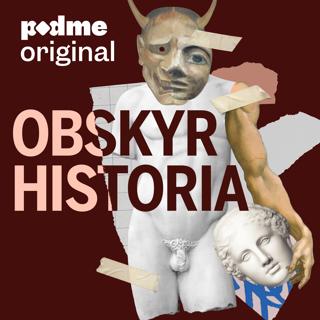
The Truth About Spartan Society
Sparta. Situated in the southern Peloponnese, this ancient Hellenic city-state has become ingrained in popular imagination as the home of unmatched Greek super soldiers, trained for war since youth and raised within a system unlike any other in the Classical Greek world. But away from common perception, what do we actually know about Spartan society? Especially during the city’s ‘golden age’ in the 5th and early 4th centuries BC? What evidence do we have for some of the most renowned stories of Spartan lifestyle? How much of it can we believe? To provide a concise overview, Tristan was delighted to be joined by Professor Stephen Hodkinson, one of the leading authorities on ancient Sparta. Part 2 will be released in a couple of weeks. Hosted on Acast. See acast.com/privacy for more information.
29 Juni 202126min

Vindolanda: Jewel of Roman Britain
Situated roughly two miles south of Hadrian's Wall in the heart of the Northumberland countryside, Vindolanda is home to some of the most remarkable archaeology from Roman Britain. Its history spans several centuries; it is a must see site for anyone wanting to know more about the ancient history of Britain. To learn more about Vindolanda, Tristan met up with Dr Andrew Birley, the Director of Excavations at Vindolanda. Hosted on Acast. See acast.com/privacy for more information.
27 Juni 202153min

Artemis of Ephesus: The Great Mother Goddess
An incredibly popular goddess, characterised in statues of her by a vest of bee hives, or are they breasts … bull scrotums? In this episode Tristan speaks to Dr Carla Ionescu about the Ephesian Artemis, the great mother goddess. They discuss the arguments behind the different interpretations of the Artemis statues, her connections to other divine female figures, and her lasting impression on the ancient city of Ephesus. Hosted on Acast. See acast.com/privacy for more information.
23 Juni 202136min

Dirty Love: The Ancient Greek Novel
The novel, and in particular the romance genre, is at the heart of a billion dollar industry, but when did they originate? In this episode, Professor Tim Whitmarsh from the University of Cambridge takes us back to some of the world’s earliest fictional narratives, the novels of Ancient Greece. Tim and Tristan explore the themes of this literature, the elements of it which are echoed in modern novels, its possible links with Persian, Jewish and Indian literature, and the stories of cultural hybridization found in the texts. Tim is the author of Dirty Love: The Genealogy of the Ancient Greek Novel. Hosted on Acast. See acast.com/privacy for more information.
22 Juni 202149min

Ancient Brittany with Sir Barry Cunliffe
Stretching out from the north west of France, Brittany has long been as identifiable with the Atlantic Ocean as with its continental neighbours in Europe. Whilst Sir Barry Cunliffe’s research and archaeological interests have taken him far and wide over the last six decades, this close neighbour of Britain continues to fascinate him. In this first of two episodes, Sir Barry takes us through the pre-Roman history of Brittany, stretching from the Mesolithic Period to the Iron Age and connections with Ancient Greece. From standing stones to voyages, bronze and lead axes to beakers, Barry explains how Brittany maintained its own identity, and the importance of its relationship with the ocean. His most recent book, Bretons and Britons: The Fight for Identity, is out now with Oxford University Press. Hosted on Acast. See acast.com/privacy for more information.
20 Juni 202143min

Scotland's Earliest Animal Carvings: An Incredible New Discovery
Prehistoric animal carvings, thought to be up to 5,000 years old, have been discovered in Scotland for the very first time. The images, which include carvings of two red deer, were found by chance on an ancient burial site in Argyll, called Dunchraigaig Cairn. Dr Tertia Barnett, principle investigator for Scotland’s Rock Art Project at Historic Environment Scotland, is on The Ancients to explain why this incredible new discovery is so significant. Find out what the carvings might mean, how they have been conserved for thousands of years, and why these images rewrite the story of prehistoric rock art in north-west Europe. Hosted on Acast. See acast.com/privacy for more information.
17 Juni 202129min

Berenike and the Red Sea Spice Route
Situated on the western coast of the Red Sea in antiquity were a series of thriving seaports, bringing in trade from as far as way as Sir Lanka. Key mercantile centres, where goods made in Iberia could theoretically have been sold alongside items crafted thousands of miles to the east, in South East Asia. Of these seaports, one of the most remarkable has to be Berenike, a thriving cosmopolitan trading centre, first for the Hellenistic Ptolemaic Kingdom and later for Imperial Rome.To talk through the site’s extraordinary archaeology we were delighted to be joined by Professor Steven Sidebotham from the University of Deleware. Steve has been leading excavations at the site for several years and in this podcast he highlights why Berenike is one of the most exciting archaeological locations anywhere in the World. Hosted on Acast. See acast.com/privacy for more information.
13 Juni 202148min

Nero: Taking to the Stage
In popular culture, Nero is thought of as the Emperor who played the fiddle as Rome burned to the ground. Whilst this might not be strictly factual, it does hint towards another side of this infamous character. For this episode, Dr Shushma Malik returns to The Ancients to discuss Nero's interest and talents in the arts: in poetry, on stage and playing the kithara. Shushma shares the evidence provided by Tacitus, Suetonius and Cassius Dio to explore how commonplace these hobbies were, how Nero's performances were received and whether they can give us a deeper understanding of Nero's matricidal behaviour. Shushma is a lecturer at the University of Roehampton and the author of, 'The Nero-Antichrist: Founding and Fashioning a Paradigm'. Hosted on Acast. See acast.com/privacy for more information.
10 Juni 20211h 1min




















